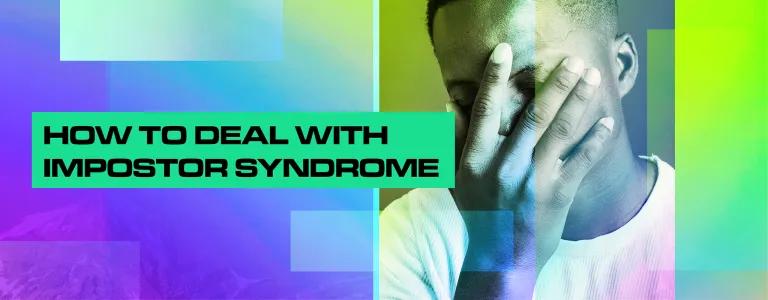
How To Deal With Impostor Syndrome
Include this article in your Skills Builder Journal. It could help you develop... 
![]()
You may have heard the term ‘impostor syndrome’ floating around before - or you might be someone who’s currently dealing with it yourself! Whether you know a lot or nothing at all, Revolution Hive are here to give us the ins, outs, and what it’s all abouts when it comes to Impostor Syndrome...
Do you ever feel like you’re just an impostor? Do your insecurities hold you back from reaching your goals or getting ahead at work or school?
For many people, these feelings of insecurity and worthlessness are known as ’Impostor Syndrome’. But don't fret - there is a way to overcome it!
What is Impostor Syndrome?
Impostor syndrome is a psychological pattern of thought, speech or behaviour where a person doubts themselves and feels that they don't deserve to be where they are. They fear other people finding them out as a fraud, or as being incompetent - even if they have evidence to the contrary.
People who suffer from impostor syndrome, often feel like they only succeeded because of luck, circumstance or some other factors outside of their controls. Not because they deserve and earned the right to be in the position they are in.
Like with many things in life, this mental pattern is one we can break free from, but it's also important to recognise that it's influenced by a variety of social structures and privileges that we may be affected by - things like our level of education, gender status, and physical/mental health will also play a role.

What are some of the signs of Impostor syndrome?
You may experience one of more of the following on a consistent basis - across various different areas of your life:
- Self-doubt: "I'm not good enough, I can't do this"
- Attributing your success to external factors: "I just got here because I'm lucky"
- Berating your performance: "Someone else could do this so much better than I could"
- Fear that you won't live up to expectations: "What's the point? I'm never going to be as good as people think"
- Overachieving: "I need to do well to prove and show I'm worthy of this, so no one finds out the truth or doubts me"
As you read through that list, consider the following questions:
- Which, if any, seem most applicable to me and why?
- Where might I be if I were able to let go of this belief?
- Did I choose to believe these things and think this way, or did I inherit these ideas from somewhere?
- What would I like to believe about my talents and abilities?
Impostor syndrome can affect people in many different ways, but one of the most common is a feeling of constant anxiety leading to a fueling of extra motivation.
Let's say for example you made a video on TikTok and it performed really well - despite it taking you only 10 to 15 minutes to make. You see lots of other creators and friends working really hard to get the same success, and so you feel like a bit of a fraud. From then on, you over-prepare and work far harder than you need to, so no one 'discovers' how much of a fraud you are.
This 'anxious motivated' state means you do work hard, but more than you need to. Your actions come from a place of nervousness and unease, rather than the initial sense of fun and freedom you had at the beginning.
Overcoming Impostor Syndrome
So you now have a fair idea of what impostor syndrome is, and some of the signs - but what can you do about it? How can you overcome this damaging way of thinking so you continue to flourish and thrive in your life today?
Here are three very simple but powerful ideas to use:
The truth is, I deserve this because:
Our first suggestion is to reflect and journal. Writing your thoughts down freely on a piece of paper, or on the notes app on your phone - wherever you prefer - allows you to take a step back and assess what is going on for you.
If you ever notice that you feel like an impostor, or like you don't deserve to be in the position you’re in, simply use the phrase: "The truth is, I deserve this because: _____________" and fill in the blank space with one reason.
On its own this activity makes sense, but where you can take it further (and what most people won't do) is to try to write at least TEN different reasons down and each one has to have TWO paragraphs explaining more.
If feeling like an impostor is really deeply hard wired into our minds, then a few one liners won't be enough. If you want to change your mind by design- not desire - using techniques like the P.E.E technique we learned in school (point, evidence & explanation) always helps.
Our minds won't change beliefs overnight, and new beliefs that we are worthy of something, require evidence & explanation.

Change the sentence - Am I worthy or is IT worthy?
Speaking of TikTok, this brilliant idea came from a recent look through the feed - where someone explained, that instead of saying to yourself “Am I worthy of this opportunity?” whenever something good happens in your life, ask yourself “Is THIS worthy of me? Is THIS a good chance for me? Is this job/promotion/success/relationship WORTHY of me?”
It's a simple but powerful reframe of something we all need reminding of - that true worth doesn't lie outside of us, but inside of us.
When we ask better questions, we find better answers, and this is a great example of that. We no longer question ourselves, and instead we ask how well something (or someone) aligns with our goals, values, ambitions and vision.
Unfollow & moderate your feed
During the first lockdown, screen time massively increased for most people and it was easy to spend far more time looking at how well other people seemed to be doing, and comparing it to ourselves.
Not only was this damaging, but it also feeds into self doubt and sense of being an impostor - If I'm so great, and such a leader in life, why am I not doing what all these other people are doing? If I care about helping others as much as I say I do, why am I not offering free support like Joe Wicks is for example?
And though most of us know how damaging self comparison is, especially in the world of fake influencers, filtered feeds & photoshop, it’s still hard not to do! Social media isn’t a bad thing, but moderation is key.

Next steps:
Feelings of being an impostor, and the way that it may affect you is completely normal. The impostor syndrome affects many people, from all walks of life.
What matters most isn't the ideas in this post, but what you do with this information.
Here are some prompt questions to help you think about what to do next:
- What is the simplest, easiest thing I can do now based on what I've learned?
- How can I be better at recognising the signs of Impostor Syndrome in myself and others?
- Who can I ask for help that would immediately be of great benefit to me?
- What else can I remind myself of, the next time feelings of doubt hamper me?




